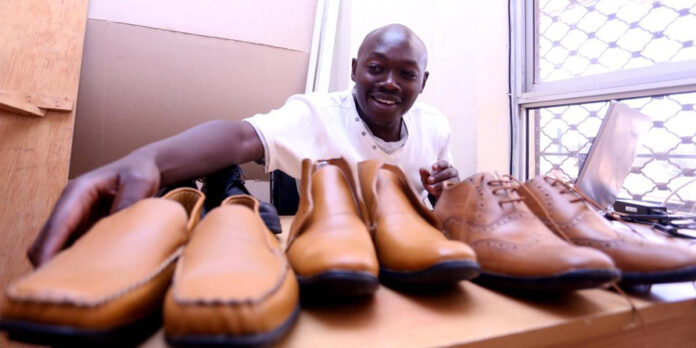Designer shoe business: Three years ago, James Ochieng’ embarked on an entrepreneurial path by chance.
While on his fourth year at the Kenyatta University pursuing a degree in environmental Science, he was hired as a marketer for a leather firm.
After months of driving successful sales campaigns as a freelancer, the 28-year-old decided to hang his boots, put pause to his studies and start his own company.
Armed with Sh40,000 capital saved up from his previous job, he founded Bantu Shoes in December 2014 in Githurai, Nairobi. He has since moved to Ngara.
His plan was to make and sell men’s leather shoes using locally sourced raw materials.
He hired a shoe maker with years of experience working at a renowned shoe manufacturing brand in Kenya, giving the business the necessary craftsmanship to start out.
Since his capital was insufficient to purchase a heavy duty machine which goes for about Sh80,000, he bought a light sewing machine at Sh5,000 and modified it, giving it the boost needed to stitch leather items.
“I started the business after months of doubt. But what made me confident to embark on it was my previous engagement where I had learnt the art of marketing and how to realize set targets,” he says.
Two years down the line, Mr Ochieng’ couldn’t be happier; Bantu Shoes has grown from a two-man affair to include six other individuals.
The firm’s monthly sales have also grown from the initial 10 pairs of shoes to over 300. Mr Ochieng’ says Bantu Shoes sells 100 pairs in a slow month and sales can go up to 350 when business is good.
The price per pair, which come with a six months warranty, ranges from Sh1,100 to Sh4,000. The portfolio includes a variety of designs such as moccasins, half boots as well as school shoes.
To produce quality products, the firm treads carefully through various processes. Careful sourcing of materials and neat stitching are key to the brand’s growth, Ochieng’ says.
“We start off by drawing a design, then sourcing of the raw materials to make prototypes. The last process involves testing the shoes, where we give various people to wear it for a month,” he says.
“The feedback we get helps us to know where to make adjustments or if the large scale production process should begin.”
While Bantu still produces shoes in the traditional way, Mr Ochieng’ has moved away from the norm by marketing his products exclusively through digital platforms.
He uses social media sites such as Facebook and Twitter as well as e-commerce platform Jumia.
“I have seen the digital avenues work excellently for my business because I am able to reach a wide clientele. I have no plan to do things the traditional way. Jumia, for instance, accounts for up to 70 per cent of the firm’s sales,” he said.
The biggest challenge in his line of business remains the cost of leather.
The vital raw material is prohibitively high at Sh180 per metre, exclusive of taxes. The lack of variety of leather patterns also hampers plans to incorporate different colour and textural designs.
However, he hopes that the government’s plan to set up a leather industrial park in Athi River will give businesspeople like him access to cheaper and better quality leather.
Another impediment he faces is that Kenyans are yet to fully embrace locally-made goods despite them being at par, if not better, with international brands.
“The challenge with most locals is that they think we cannot do premium work. But I take this as an opportunity to be the best. We keep improving on our products durability, comfort levels and look,” he says.









